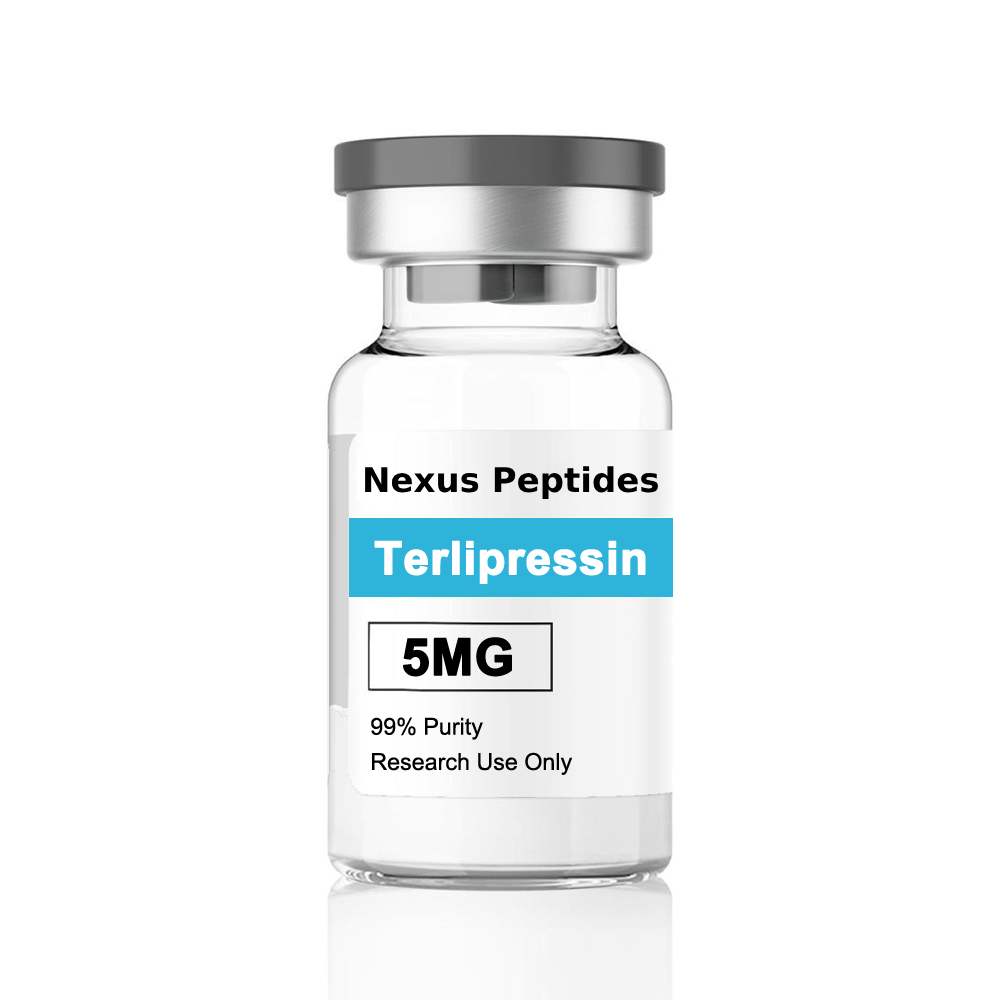

Product Description: Terlipressin
Introduction:
Terlipressin is a synthetic peptide analog of vasopressin, a naturally occurring hormone involved in regulating vascular tone and water retention in the body. This peptide is commonly used in scientific research, particularly in studies focused on vasoconstriction, blood pressure regulation, and renal function. It is an important tool for investigating the physiological mechanisms that control blood flow, particularly in the context of vascular diseases, shock, and critical care.
Terlipressin is a modified form of vasopressin, with an extended half-life, which makes it suitable for various laboratory studies that require longer duration of action. It is synthesized to enable controlled research environments where its effects on the vascular system, renal function, and other physiological processes can be studied in greater depth.
What is Terlipressin?
Terlipressin is a synthetic analogue of the naturally occurring vasopressin hormone, also known as antidiuretic hormone (ADH). It consists of the same amino acid sequence as vasopressin, but with an added glycine moiety at the C-terminus, which extends its half-life and alters its receptor selectivity.
Terlipressin primarily acts on the V1 receptors found in smooth muscle cells of blood vessels, leading to vasoconstriction. It is used in scientific research to study the effects of vasopressin analogs on blood pressure regulation, vasoconstriction, and their potential role in critical conditions, such as shock or hypotension. Although Terlipressin is utilized in laboratory settings for these purposes, it is important to note that it is intended solely for research use and should be handled with care by professionals.
Potential Different Names:
- Terlipressin acetate
- Glypressin
- 1-Deamino-8-D-arginine vasopressin (modified version)
- Vasopressin analogue
- Pressin
Chemical Formula:
The chemical formula for Terlipressin is C46H65N15O13. This represents the molecular composition of Terlipressin, which includes 46 carbon atoms, 65 hydrogen atoms, 15 nitrogen atoms, 13 oxygen atoms, and a peptide backbone.
Structure:
Terlipressin consists of a peptide chain of 9 amino acids, which is a truncated version of the full-length vasopressin molecule. The peptide sequence is modified by adding a glycine residue at the C-terminal end. This modification results in a structure that has a prolonged duration of action and increased selectivity for V1 receptors in smooth muscle. The structural changes make Terlipressin distinct from vasopressin in terms of its pharmacokinetics, leading to a longer-lasting effect in experimental studies.
How Does It Work?
Terlipressin works by binding to the V1 receptors, which are present on smooth muscle cells in the vasculature. Upon binding to these receptors, Terlipressin activates a signaling cascade that leads to the contraction of the smooth muscle cells, resulting in vasoconstriction, or the narrowing of blood vessels. This action increases blood pressure, particularly in situations where hypotension is a concern.
Additionally, Terlipressin can affect renal function, influencing water retention in the kidneys. Through its effects on vasoconstriction, it also plays a role in regulating blood flow to vital organs, such as the kidneys and liver. The extended half-life of Terlipressin compared to vasopressin makes it useful in prolonged research studies investigating the impact of vasopressin analogs on blood pressure, vasodilation, and organ perfusion.
Terlipressin's effects can be studied in a variety of experimental settings, including those focused on cardiovascular function, renal hemodynamics, and the pathophysiology of shock. Researchers also use Terlipressin to investigate how the peptide impacts conditions involving hypotension, vasodilation, or blood pressure regulation.
Conclusion:
Terlipressin is a synthetic analogue of vasopressin, a peptide hormone that plays a key role in regulating vascular tone and blood pressure. With its modified structure, Terlipressin has a longer half-life and enhanced receptor selectivity, making it valuable for experimental studies involving vascular constriction, blood pressure regulation, and renal function. As a research tool, Terlipressin helps scientists understand the mechanisms of vasoconstriction and its effects in critical conditions such as shock and hypotension.
It is essential that Terlipressin be used exclusively for scientific and research purposes. As a laboratory reagent, it provides valuable insight into the role of vasopressin analogs in regulating key physiological processes, though it is not intended for clinical use or human consumption.
Disclaimer:
This product description is intended solely for research purposes and is not approved for human consumption. Terlipressin should be handled with care in controlled laboratory environments by qualified researchers. It is crucial to follow all relevant safety guidelines, institutional protocols, and ethical standards when using this peptide. The information provided is for scientific inquiry and does not imply any medical or therapeutic claims.


